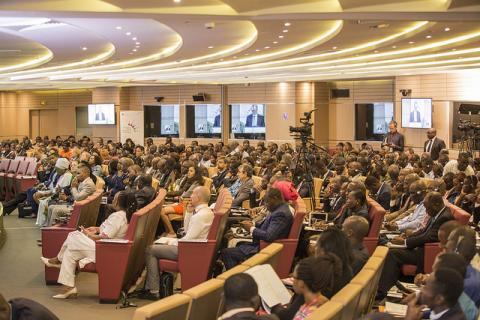
As the curtain fell on the African Development Bank’s Evaluation Week 2018, the closing remarks reflected a message that had been repeated in interventions throughout the week: There is a need for partnership and close cooperation among stakeholders to ensure that evaluation and learning play their full part in strengthening the impact of the Africa 2063 agenda.
More than 450 evaluators, development practitioners, policy-makers, government and civil society representatives, parliamentarians, academics and students met at the African Development Bank Headquarters in Abidjan, between 5 and 7 September to share knowledge and experiences on the role of evaluation in strengthening development impact. Development Evaluation Week, which this year included a capacity building workshop, a knowledge café, keynotes and interactive panel discussions, is a biennial global knowledge event organized by the Bank’s Independent Development Evaluation (IDEV).
On the first day of the event, about 65 participants met at a Knowledge Café to share ideas and experiences on how evaluations can have greater impact in Bank operations. Setting the stage for the entire week, Foday Turay, Chief Evaluation Officer at IDEV, told participants: “This Evaluation Week is about the learning objective of evaluation in achieving greater development outcomes”. The Knowledge Café focused on the key questions of improving engagement with evaluation stakeholders and tackling the challenges associated with communication and use of findings.
In parallel, another group of 77 evaluators, practitioners and experts met in a capacity-building workshop aimed at improving the understanding of gender in evaluation, while raising awareness on the need to generate and use sex-disaggregated indicators in measuring development impacts. The workshop included presentations by Elena Bardasi, Senior Economist, and Gisela M. García, Evaluation Officer of the World Bank Independent Evaluation Group (IEG) and Monica Lomena-Gelis, Principal Evaluation Officer of IDEV. Commenting on the dialogue that morning, Gisela Garcia noted that “operational staff and evaluators should work together to ensure that the right indicators are included in project design to be able to capture gender-relevant results at closing.”
A discussion session was held on the same afternoon of 5 September on the question of updating the evaluation criteria established by the Development Assistance Committee of the Organization for Economic Co-operation and Development in 1991. The participants in the discussion noted that the world has changed a lot since then and agreed that the criteria need to be reviewed and updated in light of the changing context of development policies, projects and programs, notably the Sustainable Development Goals and Agenda 2063. Participants in particular discussed the need to refine the criteria of “relevance” and “impact” in evaluation. Some also raised concern that evaluators often overlook the issue of partnership.
On the second day of Evaluation Week 2018, following the opening session that included a keynote by Hon. Nkosazana Dlamini-Zuma, Minister in the Presidency of South Africa for Planning, Monitoring and Evaluation, there was a rich interaction between participants on Public-Private Partnerships (PPPs) for infrastructure development. PPPs are increasingly popular on the African continent: between 2004 and 2013, 33 African countries enacted a PPP or concession law and 20 have adopted their PPP laws in the last 5 years. However, the session highlighted the need to meet certain conditions such as institutional frameworks and regulation, to ensure successful PPP projects.
Keynote speaker Caroline Heider, Director General and Senior Vice President of the Independent Evaluation Group (IEG), World Bank Group noted that “quality of the regulation network is needed to attract investment, particularly private sector investment”.

Another key aspect raised was the importance of the capacity of development banks and national administrations for evaluation and the need to involve all stakeholders in the evaluative process. “What is most important is dialogue and debate. We tend to outsource evaluations and don’t spend enough time discussing how we learn” noted Pierre Guislain, Vice President for Private Sector, Infrastructure & Industrialization at the African Development Bank.
The theme of achieving inclusion through agricultural value chains took center stage on the morning of the third and final day of the conference. Wambui Gichuri, Director of the Water & Sanitation Department of the Bank told the audience in her Keynote address that while the proportions of stunted children in Asia and Latin America have been falling between 2000 and 2016, Africa has seen a 17% rise. A key takeaway from the session was the need for partnerships between the private sector, governments and other development actors to ensure access to finance as well as deliberate and targeted efforts to ensure inclusivity along the whole agricultural value chain.
The final session of Evaluation Week 2018 focused on the need for partnerships to create a culture of evaluation on the one hand, and the capacity to carry out evaluations on the other. “For evaluation, there is a need to have well-chosen partnerships. We also need to involve civil society in the process", said Hon. Abbas Imbassou Ouattara, Member of Parliament of Côte d’Ivoire and Executive Committee member of the African Parliamentarians’ Network on Development Evaluation.
The importance of partnerships and cooperation was recognized throughout the Evaluation Week. “One of the primary reasons why recommendations from evaluations are not adopted is that the beneficiaries and end users of these evaluations are not consulted in the process” noted Girma Kumbi, Principal Evaluation Officer at IDEV, at the closing of the conference. Those who joined Evaluation Week 2018 learned that successful partnerships are often complex and require actors to move outside their comfort zones. One of the most important types of partnership between governments, civil society, development partners, beneficiaries and other stakeholders is the collaboration needed in carrying out relevant and useful evaluations that can inform and help to strengthen development impact and help Africa to attain the goal of its Agenda 2063.

